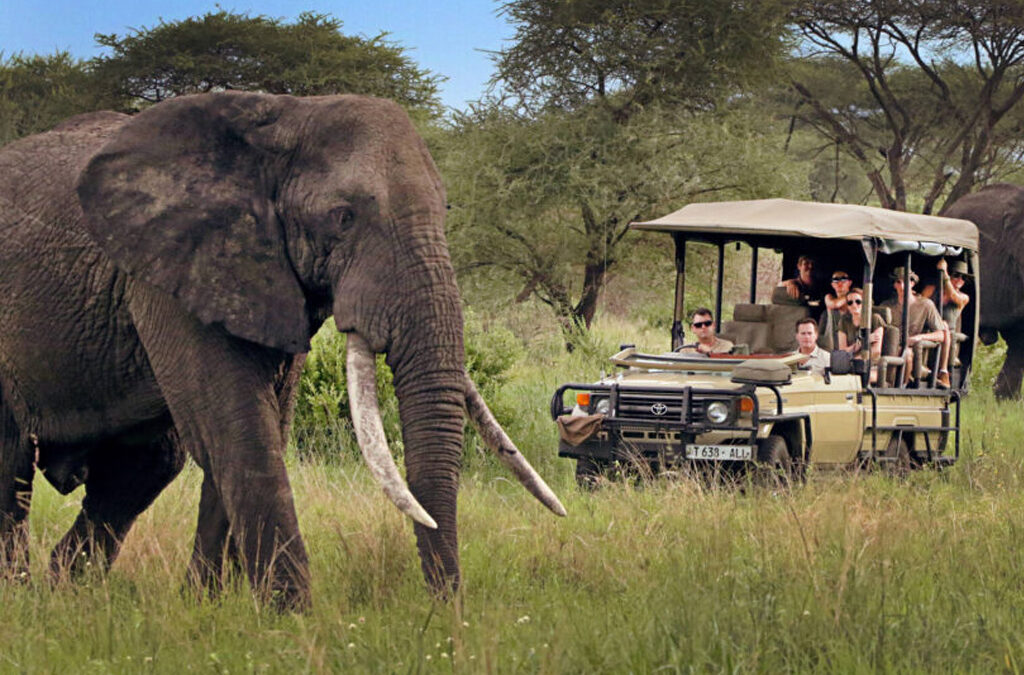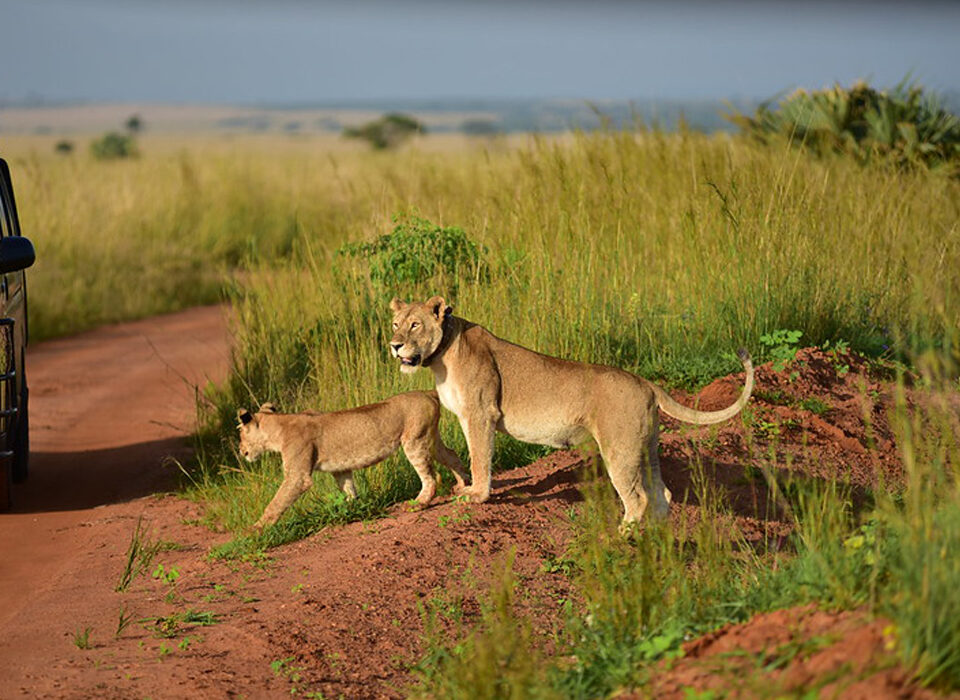
How to Choose the Right Lodge for Chimpanzee Trekking in Rwanda
August 20, 2025
Which African Country Hosts an Annual Gorilla Naming Ceremony?
August 20, 2025Is a Road Trip Safari the Same as a Guided Safari?

Is a Road Trip Safari the Same as a Guided Safari?
When planning a safari, one of the most common questions travelers ask is whether a road trip safari is the same as a guided safari. The answer is not straightforward—it depends on which aspects of the safari matter most to you. In some ways, these safaris can feel similar, while in others, they are very different. By understanding the unique features, advantages, and challenges of each, you can make an informed decision that suits your preferences.
What Is a Road Trip Safari?
A road trip safari is essentially a self-drive adventure. You rent a safari vehicle and navigate your way from your starting point through national parks, game reserves, and other safari destinations.
The biggest appeal of a road trip safari is flexibility. You decide your route, choose how long to spend at each stop, and make spontaneous detours to enjoy scenic landscapes or hidden gems along the way. Everything from meals to accommodations and activities is in your hands. Payments are usually made directly as you go, and because of this flexibility, road trip safaris are often not prebooked.
Some travelers argue that road trip safaris are budget-friendly. However, this is debatable. Costs can rise significantly for solo travelers, especially when covering vehicle hire, fuel, park fees, and accommodations alone. On the other hand, larger groups or families may find the expenses reasonable since costs are shared, making it a more affordable option in that context. The financial aspect, therefore, largely depends on the size and composition of your travel group.
What Is a Guided Safari?
In contrast, a guided safari offers a different kind of experience. With this option, you travel with a trained and knowledgeable guide who doubles as your driver throughout the trip. The guide follows a pre-drawn itinerary, ensuring you visit the best locations at the most optimal times for wildlife spotting and photography.
One of the most significant benefits of a guided safari is the expert insights the guide provides into wildlife behavior, habitats, and local cultures. This knowledge enhances your experience, giving you a deeper understanding of the environment around you.
Guided safaris also relieve you of logistical burdens. The tour operator or guide handles transportation, meals, accommodations, park bookings, and activities, allowing you to focus entirely on enjoying the safari. Payments are made upfront through the tour operator, which makes the planning process seamless and stress-free.
Key Differences Between Road Trip and Guided Safaris
The main differences between road trip safaris and guided safaris lie in control, flexibility, and logistics:
- Control and Flexibility: On a road trip safari, you are in control, making decisions on the fly and determining how your day unfolds. Guided safaris, on the other hand, follow a fixed itinerary, relying on the guide to make key decisions.
- Planning and Effort: Road trips demand more planning and personal effort, while guided safaris relieve you of these responsibilities and provide expert guidance throughout.
- Experience Depth: Both types of safaris allow you to enjoy game drives, nature walks, birdwatching, and cultural visits. The main differences arise in the timing, pace, and depth of your engagement with the environment.
Advantages of a Road Trip Safari
One of the biggest advantages of a road trip safari is the sense of freedom it offers. You can control your budget, choose your travel companions, and decide exactly when and where to stop. If you enjoy spontaneous adventures, you can pull over to photograph an unexpected herd of elephants or take a quiet detour to a scenic viewpoint without worrying about a strict schedule.
Road trips are particularly appealing for families or groups of friends because they allow for extended bonding time. Sharing the road, navigating together, and experiencing wildlife sightings at your own pace creates a unique, intimate experience that is hard to replicate on a guided safari.
However, road trip safaris also come with challenges. Long driving hours can be exhausting, especially if you are the sole driver. Managing accommodations, meals, and park activities can be time-consuming and requires good organizational skills. Vehicle breakdowns or poor maintenance can disrupt your entire trip. Additionally, if you lack knowledge about local wildlife or attractions, you may miss valuable insights that a guide could provide.
Advantages of a Guided Safari
Guided safaris allow you to relax and enjoy the journey without worrying about logistics. Your guide ensures you are in the right place at the right time for the best wildlife sightings and provides in-depth information about the flora, fauna, and cultural context. This enriches your safari experience, allowing you to see and understand things you might miss on your own.
Another advantage is the efficiency of the trip. Since the itinerary is carefully planned, you maximize your time at each location. This is ideal for travelers with limited time who want to experience the highlights without the stress of planning and navigating themselves.
Guided safaris can be more expensive due to guide fees and the comprehensive nature of the services provided. However, many travelers find the convenience, knowledge, and stress-free experience worth the additional cost. It’s important to remember that the quality of the guide significantly affects the success of the safari, so choosing an experienced, reputable guide is essential.
Choosing the Right Safari for You
When deciding between a road trip and a guided safari, consider your priorities:
- If you value independence, flexibility, and adventure, a road trip safari may be perfect. You have full control over your route, pace, and activities, and the experience can be highly rewarding, especially with a reliable vehicle and careful planning.
- If you prefer comfort, expert guidance, and a structured itinerary, a guided safari is likely a better fit. You can relax and enjoy the experience while learning from your guide and trusting that all logistics are handled. Guided safaris are particularly beneficial for first-time visitors or those with limited time.
Ultimately, both safari styles offer unforgettable experiences and opportunities to connect with nature. Whether you choose to navigate your own path or rely on a knowledgeable guide, the magic of the safari the sights, sounds, and wildlife encounters remains the same.
Final Thoughts
The choice between a road trip safari and a guided safari comes down to your personal preferences and travel style. Road trip safaris offer freedom, flexibility, and adventure, while guided safaris provide ease, expert knowledge, and convenience. Both options provide incredible opportunities to witness Africa’s natural beauty and wildlife up close, ensuring an unforgettable safari experience.
Popular Tour Packages
- 2 Days Bwindi Gorilla Trek
- 2 Days Golden Monkey Trekking in Rwanda
- 3 Days Rwanda Gorilla Tour and Golden Monkeys
- 3 Days Lake Bunyonyi and Gorilla Trekking
- 3 Days Masai Mara National Reserve Safari
- 4 Days Queen Elizabeth Safari
- 5 Days Murchison Falls Safari
- 5 Days Uganda Primates Safari
- 6 Days in Kibale, Bwindi and Murchison Falls



